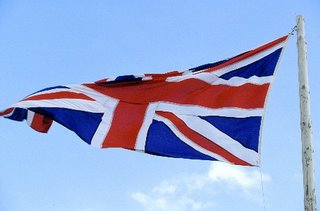
Troy's Briefs - changed most weeks - that EU payment rebate issue.
.
Frank Carstairs writes:
The following is an extract from a letter in our local paper. "...even if we had relinquished our rebate in its entirety...our net contributions to the EU budget this year would only have amounted to 0.6% of GDP. As it is ...for this year settled at 0.2% of GDP"
J W Wokingham Labour Party.
.
Anyone got some ammo for me to fire at this rodent?
.
.
Some ammo:
Well now, because of the peculiarities of the way the multi-annual EU budget pans out, the UK rebate is largely unchanged for the first three years of the financial period 2007-13, Blair's give-away kicking in only in 2010, when instead of £1 billion it will be nearly £2 billion, for that and successive years. The figure is likely to be "locked in" as a minimum annual deduction when a new budget is negotiated for the period after 2013.
.
As indeed we all struggle to come to terms with the small-print of EU budget settlement last December, a commission document has re-emerged which shows that Blair's surrender was in any event pre-ordained, since July of 2004.( "COM 2004 505 final, Volume II, Technical Annex: Financing the European Union Commission report on the operation of the own resources system")
In clinical detail the EU document sets out all the reasons why the British rebate had to be reduced, and even offered various options for its reduction, one of which Blair actually adopted.
.
The rebate problem, of course, goes back to the Thatcher's Fontainebleau agreement in 1984, when the "colleagues" agreed to a rebate (or "correction") on the UK contribution, returning 66 percent of the difference between gross contributions and receipts, a situation that survived until last month when Blair offered his spectacular surrender or to be more accurate simply followed EU Commission instructions.
.
What really messed up the Thatcher agreement was EU enlargement. As more countries joined – most of whom were to become net beneficiaries – this meant that the contributions from the net payers, including Britain, had to increase. Because that increase would be paid over to the accession countries, this meant that the gap between the UK contribution and its receipts would also increase, which necessarily meant that the rebate would increase.
.
This is pointed out in the commission document, which records that "Estimates indicate that over the period 2007-2013 the UK correction will increase by more than 50 percent compared to the average over the latest 7 years to reach an estimated £7.1 billion from £4.6 billion in the period 1997-2003." It then goes on to say:
.
''Although the envisaged enlargement to 10 new Member States was unanimously agreed at the Berlin European Council in March 1999, the UK insisted and obtained that enlargement-related expenditure be taken into account when calculating the UK correction, thus shielding it from most of the financial consequences of enlargement. That is the main reason for the expected future increase in the UK correction.''
.
This is interesting, in that this was the agreement that locked in stone the CAP spending, from which France so much benefits so, while the CAP agreement remained inviolate, the UK rebate was a different matter.
.
To start with, though, the commission did acknowledge that, in the absence of any correction mechanism, "the UK would have been on average the largest net contributor over the last seven years, and would probably remain the largest net contributor to the EU budget over the period 2007-2013."But it then pointed out that, if the current system continued, the UK net contribution would drop from a potential 0.62 percent GNI (without correction) to 0.25 percent GNI, the lowest rate for all the expected net contributors except Finland (on 0.21 percent), way below the Netherlands at 0.56 percent, Germany at 0.54 percent and even France at 0.37 percent.
.
The commission had decided in July of 2004 that "the current system of a unique correction for the UK therefore cannot continue", and continue it did not.
.
What the commission then did in the report was offer a series of options for reducing the rebate, one of which was to freeze the level at the current rate. Another was to bring down the rebate to 33 percent but another was to exclude enlargement-related expenditure. This was the option Blair chose, but it was not his – or the UK's – idea.
.
It was one of the "choices" given to him by the commission.The effect of that was to increase Britain's net contribution from 0.25 percent GNI to 0.39 percent, with the happy side-effect for our Gallic "partners" that the French net contribution went down from 0.37 to 0.33 percent, with other net contributors also reducing their payments.
.
 Blair was under intense political pressure in what was regarded as one of his worst weeks in politics since the 1997 election. Was he going to then announce that he was "under instructions" from the commission to reduce the "Thatcher" rebate? Clearly not.
Blair was under intense political pressure in what was regarded as one of his worst weeks in politics since the 1997 election. Was he going to then announce that he was "under instructions" from the commission to reduce the "Thatcher" rebate? Clearly not..
.
Blair will pay for his betrayal in Brussels - Britain which, for almost the entire period of its membership, has been one of only two countries to make any net payment to the EU – could have been spared its annual tribute of £12 billion, and might have used these savings to (for example) give us all a two thirds cut in council tax.According to the Financial Times Blair's 'concession' on the rebate appears to be far bigger than Downing Street has publicly admitted, leaving the UK up to £2bn worse off each year by the end of this decade.
.
Although the Prime Minister 'agreed' to slash the cash the UK receives from the rebate by £7bn over the seven years from 2007 to 2013, analysis of detail of the agreement shows that the UK's rebate will in fact remain untouched in 2007 and 2008. Instead, the £7bn cash loss suffered by the UK is to be compressed into the years between 2009 and 2013.An analysis carried out by the Financial Times shows that the Treasury will forego about £500m in 2009, rising to £1.5bn in 2010, and £2bn in each of the subsequent years from 2011 to 2013.Anyway, in secret (as always) the EU is planning to introduce a direct tax which will simplify the income negotiations in future decades.
On the Monday (19th December 2005) a Labour/Coop MP for West Dunbartonshire, John McFall, was prompted to put down a Written Question for the Chancellor (the Labour MP for another Scottish constituency, Kirkcaldy) on the EU Budget for the seven –year period 2007-2013 inclusive. On 20th December a Written Answer responded to Mr McFall’s question.
This is how Hansard reported the exchange (at Col 2796W):-
EU Budget
Mr McFall: to ask the Chancellor of the Exchequer, what the UK’s contribution to the EU Budget will be in each year from 2007 to 2013 under the recently agreed [in Brussels] budget.
.
Mr Gordon Brown: The estimated extra costs will be £500 million (0.09 per cent of public spending) in 2007-08, zero in 2008-09, £1.0 billion (0.16 per cent) in 2009-10, and between £1.6 billion and 1.9 billion (0.23 per cent and 0.26 per cent) each year between 2010 and 2012-13.
The fiscal forecast will be updated as usual at the Budget.
Sharp-eyed readers will have spotted that, first of all, Mr Brown ignored the actual question asked, which was: "What will the UK’s contribution be ?" Instead, Mr Brown chose to quote the "extra costs" – a quite different kettle of fish.
Second, even more curiously, Mr Brown only gave figures for six financial years, not for the seven years 2007-2013. A genuine mistake no doubt – after all, what’s a couple of billion pounds of UK taxpayers’ money between friends ?
.
In conclusion, a quote from Blaise Pascal (1623-1662) ''I have made this letter longer than usual, only because I have not had the time to make it shorter''.
.
Indeed so.
.
I trust the above posting is suitable ammo, but remember rodents fight back.
.

For further reading please click
here and
here.












































